Community College of Baltimore County: New Initiative Aimed at Giving Credit Where Credit Is Due

The Community College of Baltimore County (CCBC), Maryland, is one of 20 community colleges nationally selected by the American Association of Community Colleges (AACC) to participate in the Right Signals Initiative designed “to identify and develop a national model for recognizable credentialing.”
According to the AACC announcement release,
The purpose of the Right Signals Initiative is to demonstrate a new credentialing model that recognizes multiple quality credentials to send “the right signals” to employers, students, and colleges about the meaning of these credentials. Key credentials to be targeted are degrees, certificates, industry certifications, apprenticeships, and badges.
“We are pleased for an opportunity, through this grant initiative, to deepen and expand CCBC’s Prior Learning Assessment and credentialing activities,” remarked CCBC President Sandra L. Kurtinitis. “The college has a long history of leveraging its partnerships as a means of accelerating the efforts of our students academically, while at the same time, reducing the total cost of higher education without compromising quality.”
According to Nicole Zairi, CCBC Coordinator of Articulation, Transfer, and Prior Assessment and one of the grant’s project leaders, CCBC will be utilizing three major approaches to the Right Signals Initiative:
- Explore awarding additional prior learning assessment credit for industry and military experience. The goal would be to ascertain, using the Council for Adult and Experiential Learning guidelines, how industry and military experiences and credentials can translate into academic credit.
- Explore the possibilities of micro and macro credentials students can earn in the form of badges, certifications, or technical degrees. Micro and macro credentials could be attached directly to transcripts, alerting prospective employers of students’ actual work experiences and/or earned credentials.
- Engage with local employers and potential students from the civilian workforce and military communities to promote opportunities for accelerated completion of various credentials leading to careers. The Right Signals Initiative has the potential to allow students to use prior learning experience for up to 75 percent of the credit needed to complete an associate degree; 25 percent would have to be completed at CCBC.
Three subcommittees (Micro Credentials, Military Credit, and Macro Credentials) will focus on the mechanisms for grant. Topics will range from the cross-training of CCBC and transfer university faculty and industry partners on using the Beta Credentials Framework, a tool described by Lumina Foundation as, “designed to connect the dots among diverse credentials by using a common language to describe what recipients of each credential should know and be able to do,” to hiring staff positions—such as an Analyst I, Data Support for Military Prior Learning position—needed to assist with the credentialing cross-walks from Joint Services Transcripts (JST) to CCBC credits.
Funded by a $60,000 grant from the Lumina Foundation, in partnership with AACC, CCBC’s strategies for the 18-month grant include:
- Expanding degree offerings to students transitioning from continuing education classes and/or credit students looking for career changes in the health fields into credit degree programs.
- Exploring the development of badges, articulated credits, and other micro credentials to assist employers in identifying students with relevant industry or military work experience.
- Expanding the use of prior learning assessment so that students can utilize PLA for up to 75 percent of their credits for completion.
“This validates a student’s knowledge earned from prior learning experiences and will represent a significant savings in the cost of completing his or her degree,” noted Zairi.
Given CCBC’s growing population of student-veterans, the initiative could explore ways to compare credentials on an individual’s Joint Services Transcript to see what could count toward the student’s course requirements. This could significantly reduce the time and money student-veterans would need to complete a degree and get into the workforce.
With a student-veteran population of more than 1,200 each year for the past three years, CCBC is highly attuned to the unique higher education needs of former and active-duty military personnel. Likewise, those with industry work experience could also benefit from this assessment of previously earned credentials and skills.
For additional information about CCBC’s Right Signals Initiative, contact Nicole Zairi.
Opinions expressed in Member Spotlight are those of the author(s) and/or submitting college and do not necessarily reflect those of the League for Innovation in the Community College.










